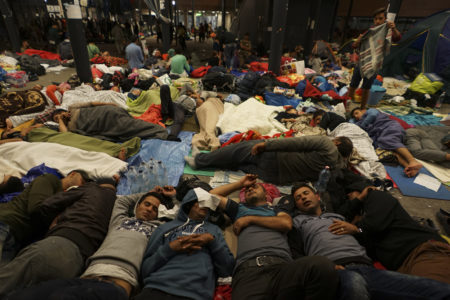In this first of three interviews conducted in New York City, Sovereign Nations Founder Michael O’Fallon and the co-founders of New Discourses, Dr. Peter Boghossian and Dr. James Lindsay, discuss the current tools of societal and institutional deconstruction being introduced throughout civilization under the banner of “Social Justice.” These, they discuss, are presented in a manner not unlike the legendary Trojan Horse.
 Dr. Peter Boghossian and Dr. James Lindsay are best known for their work in exposing the impact of “Grievance Studies” in the secular university system. The Grievance Studies affair, also referred to as the “Sokal Squared” scandal (in reference to a similar 1996 hoax by Alan Sokal), was the fourteen-month investigative whistleblowing project of a team composed of these two authors, together with Helen Pluckrose. Its mission was to create bogus academic papers and submit them to academic journals in the areas of cultural, queer, race, gender, fat, and sexuality studies. The authors’ intent was to expose problems in “grievance studies,” a term they apply to a particular approach to studying these academic topics that proceed from a radical political agenda using means adapted from postmodern cultural analysis. Their conclusion is that under that approach “a culture has developed in which only certain conclusions are allowed,” one that “put social grievances ahead of objective truth.” [1]
Dr. Peter Boghossian and Dr. James Lindsay are best known for their work in exposing the impact of “Grievance Studies” in the secular university system. The Grievance Studies affair, also referred to as the “Sokal Squared” scandal (in reference to a similar 1996 hoax by Alan Sokal), was the fourteen-month investigative whistleblowing project of a team composed of these two authors, together with Helen Pluckrose. Its mission was to create bogus academic papers and submit them to academic journals in the areas of cultural, queer, race, gender, fat, and sexuality studies. The authors’ intent was to expose problems in “grievance studies,” a term they apply to a particular approach to studying these academic topics that proceed from a radical political agenda using means adapted from postmodern cultural analysis. Their conclusion is that under that approach “a culture has developed in which only certain conclusions are allowed,” one that “put social grievances ahead of objective truth.” [1]
The result of their inquiry has created a crisis of confidence around all academic disciplines that fall under the umbrella of cultural studies, particularly those within the “theoretical humanities.” This crisis arises because not only were the methods and ethics applied in their bogus papers intentionally insufficient, but also the methodology they used for them was consistent. It always began with a conclusion or approach that they believed would flatter the political biases of the reviewers and editors evaluating their submissions and then bent the existing literature to reach those conclusions. This is, in a word, sophistry, and it cannot be trusted.
Even worse, they were able to determine that the ultimate reason for their success was not a matter of luck or a failure of the peer review system, but instead of having learned to write consistently with what their reviewers consider exemplary scholarship in those fields. They have every reason to believe that the peer review system worked exactly as intended, and they credit their success to having gained legitimate expertise in the relevant fields of thought, mostly applied postmodern Critical Theory.
This effort gained significant international attention and has created awareness of a considerable vacuum of rigor and trustworthiness in the scholarship our academies produce on culturally important topics like sex, gender, race, sexuality, and other matters of identity. This vacuum, they contend, was created by the scholars and activists they sought to expose, who used the banner of Social Justice to bully more rigorous work out of the discussion and to establish their own hegemony of thought over all topics relevant to the study of identity and culture. In this sense, they have revealed a decades-long scandal that has in many ways prevented us from the kind of successful progress we should have been able to expect in the decades following the Civil Rights Movements.

This isn’t merely a problem within the secular university system, however. As many will be aware, it has gone forth from our halls of higher education and taken root in education, law, the corporate world, society at large, and even public policy. Not only that, it has also been making significant inroads into the Christian faith, even conservative Evangelical Protestant faith. In June of 2019, the largest Protestant denomination in the world, the Southern Baptist Convention, passed a resolution stating that Critical Race Theory and Intersectionality could effectively be used by Christians as “analytical tools” alongside but subordinate to Scripture. This is what Lindsay describes as “a very fine wooden horse sitting outside your gates.”
How do they know? Beyond their expertise in how postmodern Critical Theory works, they’ve lived it, and not only once. They’ve personally watched the rise of these tools in the settings of the secular university system, which it has effectively institutionalized according to Social Justice, and they watched it tear apart the “New Atheism” movement of the early 2000s and 2010s as it was introduced there to fill the ideological vacuum felt by many atheists in the movement. One by one, Boghossian tells us, every organization he has ever loved has been infected and taken over by this parasitic ideology.
This rise of the primary tools of deconstructionism is not uncommon among other Christian denominations, secular universities, STEM fields, knitting clubs, Boy Scouts, medical fields, and corporate organizations. Social Justice’s paradigm-shifting presence is nearly everywhere. Its trajectory is also predictable. It comes in as a type of analytical tool, offered with the intention of helping to better “the oppressed” in issues of race, sex, gender, sexuality, and other identities that haven’t always had a fair shake in life, and then it does exactly what it has always claimed to do: it makes the personal political. In fact, it makes everything political, and the only politics it is interested in are identity politics.
In this in-depth discussion, Lindsay, Boghossian and O’Fallon begin by reviewing the Southern Baptist Convention’s Resolution 9 and then compare and contrast the strategic use of Critical Race Theory and Intersectionality in nearly every facet of our society. Point by point, they explain how these “analytic tools” get put into application in practice and how they undermine communities. Their stated goal is not political or to take sides. It is to help anyone who is facing the decision to adopt tools like Critical Race Theory and Intersectionality to better understand what is really being offered and how it is likely to play out if accepted.
Episode 1 Audio Version: Soundcloud, Google Play, Apple Podcasts, Spotify, Stitcher
Conversation references by Michael O’Fallon:
1. Southern Baptist Convention 2019, Resolution 9 – On Critical Race Theory And Intersectionality: http://www.sbc.net/resolutions/2308/resolution-9–on-critical-race-theory-and-intersectionality
2. Russell Moore and Beth Moore at the 2019 SBC Convention: http://www.youtube.com/watch?v=VJJUr0ixWSA&t=33m42s
3. Pastor Matt Chandler and Village Church: http://www.youtube.com/watch?v=-wmj0i1oH1Q&t=24m25s
4. The Gospel Coalition and Multiethnic Churches: https://www.thegospelcoalition.org/article/determine-church-multiethnic/
Conversation references by Dr. James Lindsay:
1. Kimberle Crenshaw — Demarginalizing the Intersection (birthplace of intersectionality) (https://chicagounbound.uchicago.edu/cgi/viewcontent.cgi?article=1052&context=uclf),
2. Mapping the Margins (https://www.racialequitytools.org/resourcefiles/mapping-margins.pdf)
3. Robin DiAngelo — “White Fragility” (2011 paper, 2018 bestselling book).
Paper: https://libjournal.uncg.edu/ijcp/article/viewFile/249/116
Book: https://books.google.com/books/about/White_Fragility.html
4. Barbara Applebaum — “Being White, Being Good” https://books.google.com/books?id=eJMZ0RxltAcC “The only way to disagree is to learn enough to agree.” (p. 46)
5. Nora Berenstain — “Epistemic Exploitation” https://philpapers.org/rec/NOREE-2
6. Alison Bailey’s “Privilege-preserving Epistemic Pushback”? 2017 paper in Hypatia https://onlinelibrary.wiley.com/doi/abs/10.1111/hypa.12354
7. Mike Nayna’s three-part documentary on The Evergreen State College. Documentary playlist: https://www.youtube.com/playlist?list=PLLHyNSlsz44_GceBMuwAyflt3lDWMEjTG
Article 1: https://areomagazine.com/2019/01/20/the-influence-of-anti-racist-scholarship-activism-on-evergreen-college/
Article 2: https://areomagazine.com/2019/03/15/teaching-to-transgress-rage-and-entitlement-at-evergreen-college/
8. Michel Foucault’s History of Madness and History of Sexuality
9. APA guidelines for traditional masculinity: https://www.apa.org/images/boys-men-practice-guidelines_tcm7-249294.pdf
10. Richard Dawkins having a stroke was a result of being disinvited from NECSS (pronounced “nexus”), apparently in 2016: https://theness.com/neurologicablog/index.php/necss-and-richard-dawkins/
11. About antiracism work, from DiAngelo, et al., specifically about ideas like “racism is everywhere always” “white people benefit most” and “the work is never done”: https://vimeo.com/116986053
12. The Rebecca Tuvel affair (Hypatia): http://nymag.com/intelligencer/2017/05/transracialism-article-controversy.html
13. The Knitting Club controversy has been written about in several parts in Quillette Kathrine Jebsen Moore. https://quillette.com/author/kathrine-jebsen-moore/
Podcast: https://quillette.com/2019/06/14/quillette-podcast-37-kathrine-jebsen-moore-on-how-knitting-was-captured-by-the-social-justice-cult/
14. Allyship is problematic: https://scholar.google.com/scholar?hl=en&as_sdt=0%2C43&q=allyship+problematic&btnG=
15. The Grievance Hoax Team’s Mein Kampf rewrite was based on that idea, thanks to the Hoaxx Team’s peer reviewers: https://www.bawker.net/cloud/squozebrain/2018-10/390022198-Our-Struggle-Is-My-Struggle-Solidarity-Feminism-as-an-Intersectional-Reply-to-Neoliberal-and-Choice-Feminism.pdf
Conversation references by Dr. Peter Boghossian:
1. “Case for Colonialism” from Bruce Gilley: https://www.nas.org/academic-questions/31/2/the_case_for_colonialism
https://www.chronicle.com/article/Last-Fall-This-Scholar/242880
Footnotes:






John Allman
“the ultimate reason for their success was not a matter of luck or a failure of the peer review system, but instead of having learned to write consistently with what their reviewers consider exemplary scholarship in those fields”
The only way to prove that would have been (for example … and so on) to draft two papers about dog parks, one which reinforced prejudices about so-called “rape culture”, the other of which challenged those prejudices, and submit one to a test group of journals and the other to a control group of journals.
That should be their project, but they’d have to anonymise the results to protect the test subject editors from embarrassment. And first, Boghossian has got to complete the ethics training.
It strikes me that this venture should never have masqueraded as “research” in the first place. If it was marketed as a prank instead, it would have fallen outside the jurisdiction of a research ethics committee, and I wouldn’t now be able to point out the obvious lack of rigour, in the absence of a control group.
Longshot
Ignore the pedantic and rather rambling comment above. The interview was amazing! Thanks so much. I can’t wait to hear the rest of the series.
Michael Wood
But scientific proof isn’t the point — in fact it isn’t even possible. The goal was to shed light on a sphere of activity that is massively opaque by design. To do this the right kind of prank should not be out of the question.
Nick
When will the next interview be released?
Richard Mann
Excellent interview, Michael. For those of us who have not studied (or been indoctrinated by) CRT, a great introduction. When James was talking about “standpoint epistemology”, that’s really what Voddie Baucham has labeled as “Ethnic Gnosticism” (https://youtu.be/Ip3nV6S_fYU). I suppose “ethnic” could represent any identity group. Voddie provides a good, Biblical analysis. I think members of the IDW likely have solid responses to all the “Critical” ideologies, but I think the Evangelical church is largely unprepared to deal with these “attractive” Trojan Horses, and sadly the divisiveness is increasing.
Dan Cornette
I think a way to understand the weakness of “standpoint epistemology” is to consider the social context of the person who is “privileged.” For the sake of the SJWs, you could ask whether Rep. Ilhan Omar (a black, Muslim, woman) would feel more disadvantaged at a church picnic in rural Alabama or the Riverside Church (a large black church) in Harlem, NY. Once we establish that privilege is correlated to social context it should be straightforward to show that a poor, white cis gendered male from rural Mississippi and wearing a camo baseball cap would have less privilege at a gay rights Pride parade in downtown Boston. So, essentially, one’s privilege depends on his or her social context, and depends on whether the level at which we are looking at privilege, e.g., local, regional, national, hemispheric, or global.
Michael Greiner
Thank you, thank you. I appreciate this conversation tremendously. Three cis-gendered white western males OR three men talking? If it is the former, I would not know what to make of it. But since it is three men talking? Excellent conversation.